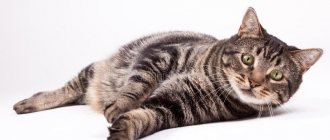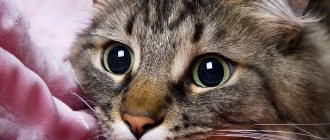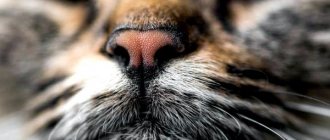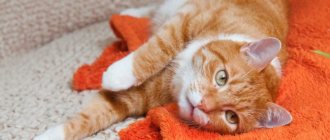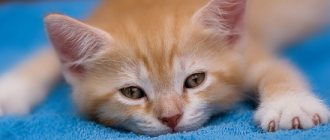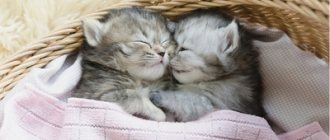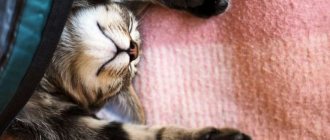No healthy animal in normal condition would deprive itself of food and starve. It’s another matter if it gets sick or if there are other, no less objective and important reasons for refusing food and water. Cat owners need to be able to grasp the nuances so as not to miss the first signs of illness and take their pet to the veterinarian in time for an examination.
Reasons why a cat may lose appetite
Desire is natural for any living being. Food provides energy to the body not only for activities directed outward (any movement), but also for the functioning of internal organs. Therefore, not eating for long periods of time is detrimental to health.
And then you notice that your pet, who until this moment was active and ate according to a schedule, suddenly ignores the bowl, and spends most of the time in a dormant state. It is necessary to determine the cause of the cat's changed behavior in order to provide her with the necessary help. Factors leading to refusal of food and water along with a decrease in activity may be psychological or medical.
Psychological
Psychological reasons include various stressful conditions for the animal:
- Moving to a new place of residence. Until the animal gets used to its new home, it may not only not feel the desire to eat, but also not go to the toilet. It is believed that an adult animal can behave this way for 2 days, and its condition does not require correction.
Everything in the new apartment is still foreign to the cat, she needs time to get used to it.
- Change of owner. Contrary to the prevailing opinion that a cat becomes attached to the house, and a dog to its owner, “their” person is also important for mustaches. Many cats choose their owner once and for all, and separation from him can cause deep stress for the animal.
- Change of diet. If a cat is suddenly switched to a new diet, it may refuse to eat at all, and lethargy will be a logical consequence of a weakening of the body.
- The appearance of a new pet or family member in the house, as well as guests (if they arrived for several days). Not all cats are friendly and easily accept any changes in their territory. Therefore, new people or animals are a stressful situation that you need to get used to. If people are noisy, and the animal psychologically suppresses the pet (for example, the owners got a dog that doesn’t like cats), then the stress can drag on.
Usually, even in a state of stress, a cat has a normal body temperature. But the appetite is completely absent, that is, the animal will not even touch the “yummy”.
A pet’s wet nose can serve as a relative indicator of general health (however, after sleep it can be dry, which is also the norm).
Medical
Another group of reasons for feeling unwell and refusing to eat is associated with the development of a disease. The main factors may include:
- Infectious and inflammatory diseases accompanied by fever. When fighting an infection, the body mobilizes all its reserves, so a pet may indeed not eat or drink for several days (just like a person, when he feels unwell, may not feel either the need for food or the desire to eat).
- Diseases of the urinary system. They are mainly associated with the formation of kidney stones and their movement through the ureters or blockage of the latter. The animal may experience severe pain and not approach the bowl, preferring to lie in a secluded place.
- Poisoning or gastrointestinal disorder. A pet can be poisoned not only by low-quality food, but also by household chemicals. Walking pets have a high risk of eating some poisonous insect or mouse, which in turn may already be poisoned. Against the background of intoxication of the body, the cat does not feel the desire to eat or drink, but it will have other symptoms (fever, vomiting, diarrhea).
- Injuries. Most often, injuries are manifested visually - the animal limps, experiences pain when moving (it may scream sharply or even bite when trying to pick it up). A type of injury may be a foreign body getting stuck in the throat. But even then the pet will cough, he may vomit, or wheeze when breathing.
- Diseases of the gums, teeth, and oral cavity. At the same time, the animal does not eat or drink simply because it hurts to do so. Older cats may refuse solid food due to their inability to chew it.
Inflammation of the gums in cats is a common reason for refusing to eat.
Loss of appetite and lethargy may also be caused by:
- helminthic infestations;
- infection with ectoparasites (fleas, subcutaneous ticks);
- allergic reactions.
During the period of sexual heat and estrus, female cats may not eat for several days.
My roaming cats generally disappeared from the yard for 2-3 days. Maybe somewhere they intercepted something like a mouse, but then they returned thin and hungry. Now they are all sterilized, but sometimes they also go away for a couple of days (I don’t know for what reasons). During this time I manage to change my mind, but then they come back and start eating off and sleeping off.
Medical causes are very diverse, each with specific symptoms. Only a veterinarian can accurately establish a diagnosis, and sometimes solely based on the results of tests and examinations. Therefore, in this case, you cannot self-medicate; it is better to rush to see a specialist.
The owner’s main task is to observe the animal and record various events that occurred before the change in the pet’s behavior and could play a role in its current condition. All this information will be needed at an appointment with a veterinarian in order to most fully describe the clinical picture of the cat’s well-being.
In kittens
In small kittens, the cause of lack of appetite and lethargy can be any infectious disease, as well as parasitic infestations (flea infestation can even cause severe anemia, which practically never happens in adult animals). For a small organism, this condition is more dangerous and can be fatal due to an imperfect immune system, faster dehydration and weakening of the body.
But stressful situations usually do not have a strong impact on children. They adapt much faster to any changed conditions and, on the contrary, show increased curiosity. And if symptoms of food refusal are observed for more than a day, then you should look for another reason for this.
Video: why a cat refuses to eat
How many days can a cat live without food and water?
Lack of water is more detrimental to a pet than refusal of food. An animal can live without obvious health consequences for no more than 2 days.
It has been observed that cats can live without water for up to 5 days. But at the same time, they will already experience irreversible changes in the functioning of organs and systems (primarily cardiovascular, urinary and nervous).
Cats can live up to 10 days without food if they constantly drink water. If the animal does not eat or drink, then after 5 days health problems will begin, including failure of vital organs (primarily the kidneys).
Parasitosis and skin diseases
The main cause of dermatitis in a newborn is infection by parasites or fungi. In both cases, unbearable itching appears, and secondary infections quickly penetrate the scratches.
Helminthiasis
Helminths enter the body in utero, through mother's milk, from other animals or from the owner's street shoes. In addition to scabies near the anus, infected people experience vomiting, diarrhea, conjunctival lesions and bloating.
Some worms are dangerous to humans, so do not delay treatment. Anthelmintic drugs are used to kill parasites, but due to their toxicity, the dosage and method of use should be checked with a veterinarian.
Flea infestation
Flea infestation is very difficult for newborns. Due to blood loss, they become anemic. There is also a possibility of infection by tapeworm larvae and mycoplasmas carried by fleas.
If your baby is constantly itching, covered in ulcers and becomes irritable, book him in for an examination at the veterinary clinic. Anti-flea drugs are no less toxic than anthelmintic drugs, so you will need to consult a specialist.
Ringworm
Infection with fungi is accompanied by severe itching, hair loss, discoloration, peeling and inflammation of the skin. Ringworm is difficult to treat. Recovery takes at least 1 month.
The sick person is placed in strict quarantine, isolated from other family members. Fungal spores are very tenacious. To destroy them, it is necessary to disinfect the entire room and get rid of the infected person’s personal belongings, replacing them with new ones.
Ear mite
The presence of otodectosis can be easily determined by brownish-black discharge from the ears, periodic shaking of the head and redness of the affected skin. In severe cases of the disease, the animal may lose hearing, so do not delay treatment. All four-legged family members will have to be treated for scabies parasites, since the disease is quickly transmitted when keeping several pets at the same time.
When to rush to the vet
Within 24 hours after discovering that the cat is not eating or drinking, you should simply observe it, paying attention to other symptoms, if any. But even if in general the pet’s condition does not cause concern (refusal of food and drowsiness are the only signs), it is still worth consulting with a veterinarian, because many pathologies have a hidden course (for example, the presence of malignant tumors becomes obvious only in the later stages).
If you have the following symptoms, you should contact your veterinarian as soon as possible:
- vomiting and diarrhea - usually always accompany poisoning or infectious diseases, and also increase the risk of rapid dehydration;
- increased temperature - it should be remembered that a temperature of up to 39 degrees is normal for cats, and only exceeding this indicator indicates a fever;
- rashes of any type - we can talk about both an allergic reaction and an infection;
- hair loss - may be a symptom of an infectious lesion or parasitic infestation.
You should be especially wary if the pet hides in secluded corners and avoids contact with the owner - only very sick animals behave this way.
How to protect your kitten from diseases
To protect your little pet, you need to take care of its health even before birth. This will be helped by competent care of the mother, who protects her offspring from infections until vaccinations are given.
Ensuring the normal course of pregnancy of the mother cat
Before mating, it is necessary to undergo all mandatory vaccinations in order to build immunity against the most dangerous viruses, and deworming. During pregnancy, a lot of attention will have to be paid to feeding and living conditions:
- Increase your daily food intake by 10%. In this case, there will be enough nutrients not only for the cat, but also for her offspring.
- Increase the frequency of feedings. Despite the increase in the norm, you cannot feed the daily portion in just 2 meals. Do not overload the stomach and feed your pet 5-6 times a day in small portions.
- Enrich your diet with vitamins and minerals. If your pet eats dry food, then choose a new product designed specifically for pregnant and lactating animals. When feeding natural food, it is better to discuss this issue with your veterinarian. Without preliminary testing, there is a risk of overdoing it or, conversely, not getting enough elements necessary during this period. Such a mistake is fraught with hypo- or vitamin deficiency.
- Create a safe and cozy "nest" to prevent childbirth under the sofa.
- Swap a large play set for a horizontal scratching post. An unsuccessful landing from a high surface can cause miscarriages.
By following these recommendations, your mustachioed pet's pregnancy will be easy and unnoticed. During childbirth, it is better to invite a veterinarian, since in an emergency he will be able to provide first aid.
Pre-vaccination period
This period is one of the most dangerous, but if the mother cat is vaccinated in a timely manner, there is no need to worry about the health of her offspring. For additional prevention, it is recommended to avoid walking outside, not to let small pets out into the hallway, and to put all outdoor shoes along with clothes in a tightly closed closet.
How to help your pet
The best help for your pet is to see a doctor. An exception may be situations when you are absolutely sure that such a condition is caused by stress. For example, a recent move to a new place of residence or the arrival of a new pet or family member. But even here your cat needs help. There are special medications that will help the animal calm down faster and enter the usual rhythm of life (for example, Kot Bayun infusion, collar or Feliway spray).
Feliway is a specially developed pheromone for cats that helps normalize the pet’s behavior in a stressful situation.
Before visiting the veterinarian
Before visiting the veterinarian, the owner can independently take measures to somehow alleviate the pet’s condition:
- Ensure peace and quiet, remove light irritants (dark windows).
- If possible, isolate from other pets (if there are any in the house) in case of an infectious disease.
- Place the pet on a clean bedding, not too soft, but comfortable.
- Place clean water and some of your favorite food next to your pet.
- You can force the cat to drink from a syringe without a needle (2-3 ml every half hour). This must be done if your pet has diarrhea or vomiting, or if the sick person is a kitten.
Drinking from a syringe is a necessary measure to prevent dehydration.
- If there is grass specially grown for your pet, offer it.
You cannot give any medications on your own without the advice of a veterinarian. They can smooth out the symptoms, and it will be more difficult for the doctor to understand the true cause of the cat’s ill health.
You can call your veterinarian by phone and get advice . He will not make a diagnosis over the phone, but he will be able to give some professional recommendations that can help the animal before arriving at the clinic.
I always have a piece of paper pinned with a magnet on my refrigerator with the veterinarian’s number (it’s also written into my phone’s contact book). I usually call to find out a convenient time to accept my pets (so as not to sit in line later). But one day I needed a consultation when the cat was vomiting (she was poisoned by something, as it turned out later, but we did not identify the exact source, because she was walking in the yard and could have eaten anything). The clinic was no longer open (it was evening), and over the phone the doctor advised me to feed the cat Enterosgel and forcefully give her water. This way we were able to hold out until the morning, when the cat was able to receive help at the clinic (including putting on an IV).
After receiving doctor's orders
After the veterinarian has made a diagnosis and prescribed treatment, you should strictly follow all his recommendations. Do not hesitate to clarify all the details regarding taking medications.
Never stop treating your pet before the time prescribed by your doctor, even if it seems to you that he has completely recovered. Infectious diseases require a full course of therapy.
Perhaps the doctor will advise changing the diet, making it more gentle on the pet’s gastrointestinal tract. Special lines of well-known brands of cat food may be suitable, for example:
- Gastro Intestinal from Royal Canin;
Royal Canin Gastro Intestinal - diet for cats with digestive disorders
- Vet Life Cat Gastrointestinal from Farmina;
- PRO PLAN Veterinary Diets EN Gastrointestinal;
- Hill's Prescription Diet Feline i/d.
Additional recommendations
Following these recommendations will help your cat recover faster:
- A calm environment will help your cat get out of stress. You should not force your pet into games and communication.
- If your pet refuses the new diet, go back to the old one. If this is not possible, look for other cat food options (some animals refuse certain brands, so trial and error is the only way to find the right food).
- Ecto- and endoparasites are destroyed using special preparations. There is no need to use them before visiting a doctor, but in the future it is always better to use them for prevention.
- Inflamed gums can be treated with a solution of chlorhexidine or manganese (faint pink). This procedure is carried out twice a day. A piece of gauze is soaked in a medicinal solution and gently pressed onto problem areas of the oral cavity without applying pressure. Depending on the affected area, you can also use cotton swabs, precisely treating the desired areas.
